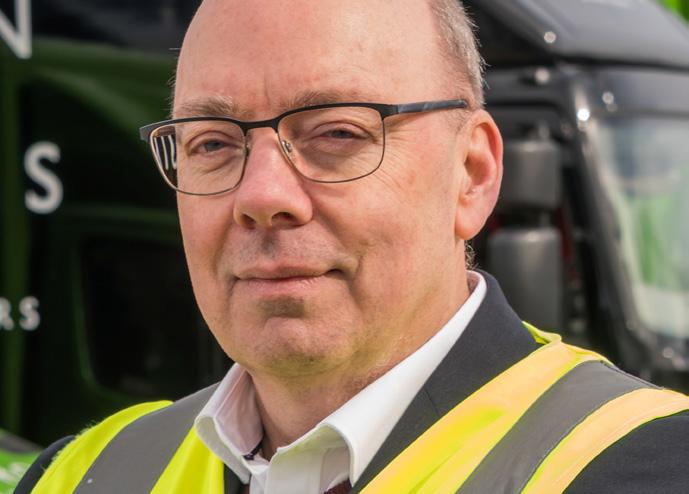
4 minute read
A company backing alternative fuels
from GreenFleet 128
by PSI Media
As well as building a dedicated biomethane gas filling station at its head office in Bracknell this year, the John Lewis Partnership has a target to stop using fossil fuels across its entire 4,800 fleet by 2030. Justin Laney, the company’s general manager of central transport, talks through the plans
John Lewis Partnership has been using biomethane since 2015. What makes this fuel suitable for your objectives?
Transport contributes over 25 per cent to the John Lewis Partnership’s operational carbon emissions and that’s why we established an industry leading aim to have a zero carbon transport fleet by 2045.
Biomethane forms an important part of our transport carbon reduction. And because long distance, heavy trucks form about 15 per cent of our fleet and are accounting for 70 per cent of our emissions, these vehicles were our priority and are the hardest to tackle.

Justin Laney, general manager of central transport, John Lewis Partnership
We’ve been working with alternative fuels for over a decade. Back in 2011 we worked with Imperial College Biofuels Department - a leader in this field – to assess a broad range of biofuels, looking for the best combination of true sustainability, sufficient scale to make a real difference, and potential to deliver a credible business case vs diesel. Biomethane created from the right waste materials was identified as the optimum solution.
To achieve a zero net carbon fleet we need to transition to a fully electric heavy vehicle fleet but current technology and infrastructure does not support this so we have invested in biomethane – a low-carbon alternative to diesel – for the past eight years and have been one of the pioneers in the UK. Our commitment to it is so strong that by 2028 all 600 of our heavy goods vehicles for John Lewis and Waitrose will be switched to biomethane.

Advertisement
Although biomethane isn’t net zero, it is the best alternative for the time being as it’s 100 per cent renewable and is made from food waste and food processing waste materials rather than diesel, each vehicle reduces CO2 emissions by 80 per cent, with each truck saving over 100 tonnes of CO2 every year. These gas trucks are also quieter, decreasing noise pollution, which is especially important when we do urban deliveries.
Tell us about the biomethane gas filling station you are having built at your head office
Our new biomethane gas filling station will be built in conjunction with Air Liquide and will open at the Waitrose head office in Bracknell in December 2020, making it our first on-site gas filling station. It will facilitate the conversion of 120 Waitrose heavy goods vehicles to biomethane and complement gas filling stations already in use near to John Lewis and Waitrose regional distribution centres in Leyland, Lancashire, and in Northampton. The station will be funded, built and managed by Air Liquide and we have a seven year contract to draw fuel from the site.

How much carbon have you saved since using biomethane?
To date, about 17,000 tonnes of carbon have been saved and when all the heavy trucks are running on biomethane in 2028, we’ll be saving around 60,000 tonnes per year. For the new gas filling station we are building in Bracknell, over the next seven years, this site alone will save over 70,000 tonnes of CO2, equivalent to the carbon footprint produced by over 13,000 UK households.
The John Lewis Partnership has revealed an ambition to stop using fossil fuels across its entire 4,800 fleet by 2030. What does that mean for its vans and cars?
We want to reduce carbon emissions across our entire transport network further and the Partnership’s ambition is to eliminate fossil fuels from its commercial vehicle and car fleet by 2030. This radical initiative would see 1,750 electric vans and light trucks introduced and approximately 750 refrigerated trailers converted from diesel to electric drive. In addition, the Partnership’s 1,300 strong car fleet would become 100 per cent electric and any remaining vehicles that could not be converted to biomethane or electric will use hydrotreated vegetable oil (HVO) biodiesel.

What advice would you give to other businesses looking to green their operations?
My advice would be to focus on efficiency initially, reducing the energy needs of your operation by reducing miles driven and improving MPGs. Start trials of alternative fuels early, so you have maximum experience before rolling out. Engage with the many bodies out there who can help with advice such as the Low Carbon Vehicle Partnership, Centre for Sustainable Road Freight and the FTA.
I’d also point out that infrastructure is more difficult than vehicles, but it is essential for it to be in place before vehicles are delivered. Make sure you have redundancy built in and mitigations for failures or late commissioning.
FURTHER INFORMATION
www.johnlewispartnership.co.uk

Advertisement










